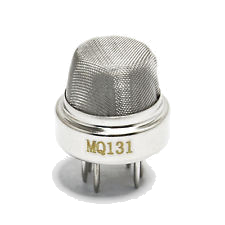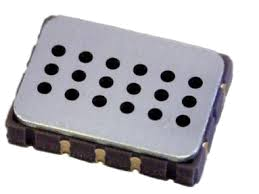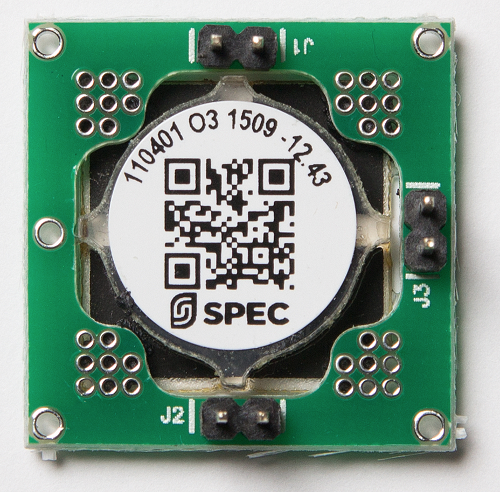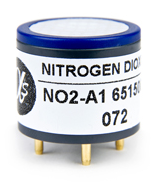Share: aqicn.org/sensor/gas/
This page contains list of Gas sensors "suitable" for ambient and outdoor Air Quality sensing, and currently under tesing by the World Air Quality Index project Earth Sensing labs. (For a complete list of all the Air Quality Sensors test on the World Air Quality Index project, check our sensor overview page) The most common Gas Air pollutants are Ozone (O3), Nitrogen Dioxide (NO2), Sulphur Dioxide (SO2), and Carbon Monoxyde (CO), but it is also common to measure Hydrogen Sulphide (H2S), Methane (CH4), Benzene (C6H6)...
--
Ozone
Ambient Ozone sensing is done in the range 0 ~ 500ppb (for reference 54ppb corresponds to an AQI of 50 - at 8 hours exposure, and 500 ppb corresponds to an AQI of 500 at 1 hour exposure, using the US EPA standard).
The most common and official way to measure ground level Ozone is by UV absorption photometry (WMO ref), The "low-cost" Ozone sensors, on the contrary, are based on electro-chemical analysis, and are therefore much less accurate than photometers.
- Winsen MQ 131
- A3OZ EnviroceL®
- Sensortech Mics 2614
- Spec 3SP-O3-20
Manufacturer: Zhengzhou Winsen Electronics Technology Co., Ltd.
Cost: 60RMB.
Spec: Spec sheet, product page
Detection range: 10 ppb ~ 1ppm (for the low concentration version)
Detection accuracy: unknown.
Cost: 60RMB.
Spec: Spec sheet, product page
Detection range: 10 ppb ~ 1ppm (for the low concentration version)
Detection accuracy: unknown.
 The MQ 131 is a electro-chemcial Ozone sensor able to detect on the range from 10 ppb to 1 ppm.
The MQ 131 is a electro-chemcial Ozone sensor able to detect on the range from 10 ppb to 1 ppm. Manufacturer: City Tech
Cost: ? (>1000RMB)
Spec: Spec sheet, product page
Detection range: 0-10ppm
Detection accuracy: 20ppb.
Cost: ? (>1000RMB)
Spec: Spec sheet, product page
Detection range: 0-10ppm
Detection accuracy: 20ppb.
 The A3OZ sensor is one of a range for monitoring gases at levels found in the environment. It is designed to give accurate readings of O3 or NO2 in ambient air.
The A3OZ sensor is one of a range for monitoring gases at levels found in the environment. It is designed to give accurate readings of O3 or NO2 in ambient air. Manufacturer: sgxsensortech.com
Cost: 120RMB.
Spec: Spec sheet, product page
Detection range: 10 ppb ~ 1ppm
Detection accuracy: unknown.
Cost: 120RMB.
Spec: Spec sheet, product page
Detection range: 10 ppb ~ 1ppm
Detection accuracy: unknown.
 The Mics 2614 is a SMD O3 sensor able to detect on the range from 10 ppb to 1 ppm.
The Mics 2614 is a SMD O3 sensor able to detect on the range from 10 ppb to 1 ppm.It is unfortunately discontinued since early 2016 due to supply problems with the special wafers used in manufacturing.
Manufacturer: spec-sensors.com
Cost: 60RMB.
Spec: Spec sheet, product page
Detection range: 20 ~ 20 ppm
Detection accuracy: unknown.
Cost: 60RMB.
Spec: Spec sheet, product page
Detection range: 20 ~ 20 ppm
Detection accuracy: unknown.
 The Spec Sensors 3SP-O3-20 is detecting O3 in the range 0 - 20 ppm, with uknwown accuracy... - which makes it not suitable to ambient Ozone sensing.
The Spec Sensors 3SP-O3-20 is detecting O3 in the range 0 - 20 ppm, with uknwown accuracy... - which makes it not suitable to ambient Ozone sensing. --
Nitrogen Dioxide
Ambient NO2 sensing is done in the range 0 ~ 2000ppb (for reference 54ppb corresponds to an AQI of 50, and 2000 ppb corresponds to an AQI of 500, using the US EPA standard).
The are at least 3 common and official methods for measuring NO2: (Derfra ref) The first two are based on infra-red absorbtion resp. em-radition, and the 3rd one, but also most recent, is based on the Chemiluminescence principle. The "low-cost" Ozone sensors, on the contrary, are based on electro-chemical analysis, and are therefore much less accurate than any of the 3 above methods.
- Sensortech Mics 2714
- Alpha Sense NO2 B43F
- Sensortech SGX EC4 20 NO2
- Winsen ZE03
- Honeywell 4NO2-20
- DD Scientific GS+4NO2
Manufacturer: sgxsensortech.com
Cost: 150RMB.
Spec: Spec sheet, product page
Detection range: 50 ppb ~ 5ppm
Detection accuracy: unknown.
Cost: 150RMB.
Spec: Spec sheet, product page
Detection range: 50 ppb ~ 5ppm
Detection accuracy: unknown.
 The Mics 2714 is a SMD Nitrogen dioxide sensor able to detect on the range from 50 ppb to 5 ppm. Note there there is another variant, the Miscs 4514, able to detect higher NO2 ranges, but the 2714 is the most suitable for Ambient NO2 sensing.
The Mics 2714 is a SMD Nitrogen dioxide sensor able to detect on the range from 50 ppb to 5 ppm. Note there there is another variant, the Miscs 4514, able to detect higher NO2 ranges, but the 2714 is the most suitable for Ambient NO2 sensing. Unfortunatelt, the Mics 2714 is not able to detect NO2 below 50ppb (ie an AQI of 50), so that is not so usefull for places with low NO2 concentration (which is quite often the case).
Manufacturer: alphasense.com
Cost: 1000RMB.
Spec: Spec sheet, product page
Detection range: 0 ppb ~ 2ppb
Detection accuracy: unkown.
Cost: 1000RMB.
Spec: Spec sheet, product page
Detection range: 0 ppb ~ 2ppb
Detection accuracy: unkown.
 The Alpha Sense NO2 B43F is a special low-concentration version of the NO2 familly range, detecting NO2 in the range 0 - 2 ppm, which makes it suitable for ambient sensing.
The Alpha Sense NO2 B43F is a special low-concentration version of the NO2 familly range, detecting NO2 in the range 0 - 2 ppm, which makes it suitable for ambient sensing. Manufacturer: sgxsensortech.com
Cost:
Spec: Spec sheet, product page
Detection range: 0 ppb ~ 2ppm
Detection accuracy: unkown.
The Sensortech ZE03 is detecting NO2 in the range 0 - 20 ppm, with uknwown accuracy... - which makes it not suitable to ambient NO2 sensing. Cost:
Spec: Spec sheet, product page
Detection range: 0 ppb ~ 2ppm
Detection accuracy: unkown.
Manufacturer: winsen-sensor.com
Cost:
Spec: Spec sheet, product page
Detection range: 0 ppb ~ 2ppm
Detection accuracy: unkown.
The Winsen ZE03 is detecting NO2 in the range 0 - 20 ppm, with uknwown accuracy... - which makes it not suitable to ambient NO2 sensing. Cost:
Spec: Spec sheet, product page
Detection range: 0 ppb ~ 2ppm
Detection accuracy: unkown.
Manufacturer: honeywell.com
Cost: 450RMB.
Spec: Spec sheet, product page
Detection range: 0 ppb ~ 2ppm
Detection accuracy: 100ppb.
The Honeywell is fomerly knonw as Solidsense 4NO2-20. The 4NO2-20 (like the 7NO2-20) is able to detect NO2 in the range 0 to 20 ppm, with a resoliution of 100ppb - which makes it not suitable to ambient NO2 sensing. Cost: 450RMB.
Spec: Spec sheet, product page
Detection range: 0 ppb ~ 2ppm
Detection accuracy: 100ppb.
Manufacturer: ddscientific.com
Cost: 460RMB.
Spec sheet, product page
Detection range: 0 ppb ~ 30ppm
Detection accuracy: 200ppb.
The DD GS+4NO2 is detecting NO2 in the range 0 - 30 ppm, with accuracy of ±200 ppb - this is too sensitive for ambient NO2 sensing. Cost: 460RMB.
Spec sheet, product page
Detection range: 0 ppb ~ 30ppm
Detection accuracy: 200ppb.
--
Sulphur Dioxyde
Carbon Monoxyde
--
For the list of all air quality sensors, check the Sensor Overview page
Read or publish comments (they rely on Disqus)

